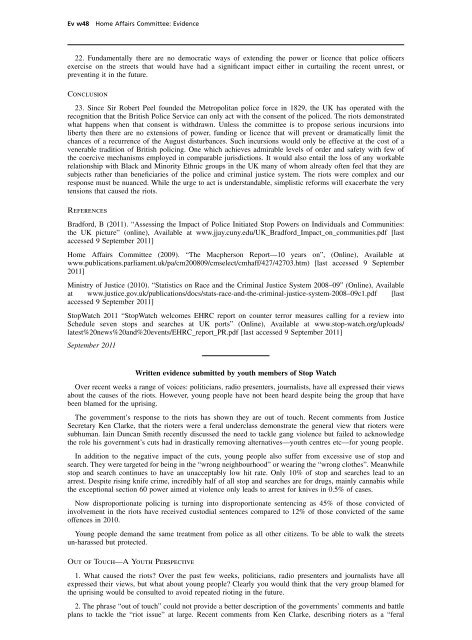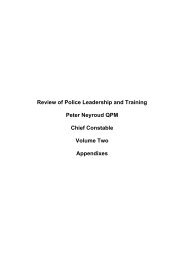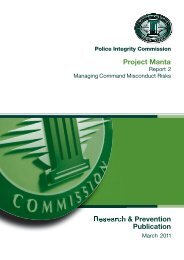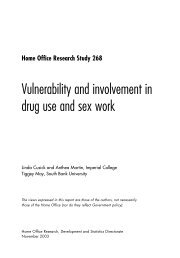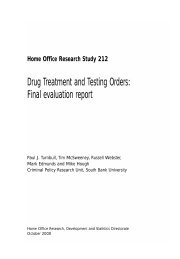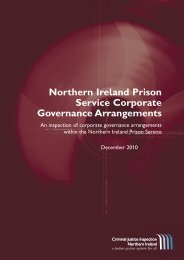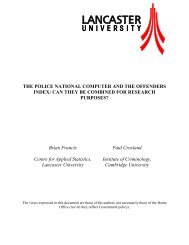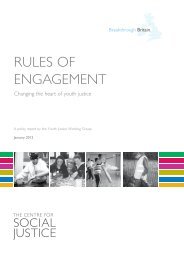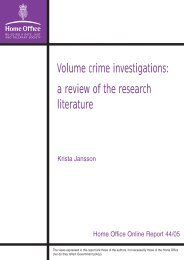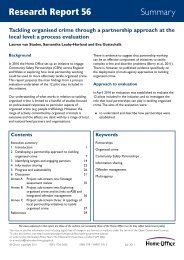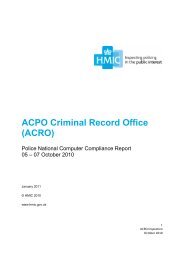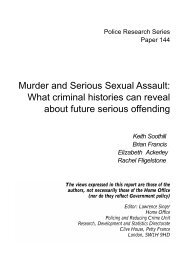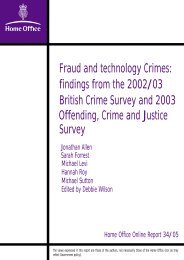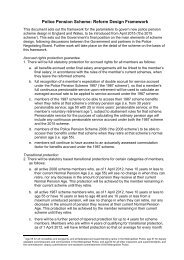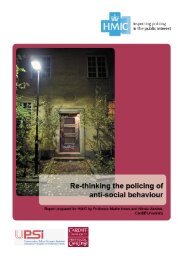Policing Large Scale Disorder: Lessons from the disturbances of ...
Policing Large Scale Disorder: Lessons from the disturbances of ...
Policing Large Scale Disorder: Lessons from the disturbances of ...
You also want an ePaper? Increase the reach of your titles
YUMPU automatically turns print PDFs into web optimized ePapers that Google loves.
Ev w48 Home Affairs Committee: Evidence<br />
22. Fundamentally <strong>the</strong>re are no democratic ways <strong>of</strong> extending <strong>the</strong> power or licence that police <strong>of</strong>ficers<br />
exercise on <strong>the</strong> streets that would have had a significant impact ei<strong>the</strong>r in curtailing <strong>the</strong> recent unrest, or<br />
preventing it in <strong>the</strong> future.<br />
Conclusion<br />
23. Since Sir Robert Peel founded <strong>the</strong> Metropolitan police force in 1829, <strong>the</strong> UK has operated with <strong>the</strong><br />
recognition that <strong>the</strong> British Police Service can only act with <strong>the</strong> consent <strong>of</strong> <strong>the</strong> policed. The riots demonstrated<br />
what happens when that consent is withdrawn. Unless <strong>the</strong> committee is to propose serious incursions into<br />
liberty <strong>the</strong>n <strong>the</strong>re are no extensions <strong>of</strong> power, funding or licence that will prevent or dramatically limit <strong>the</strong><br />
chances <strong>of</strong> a recurrence <strong>of</strong> <strong>the</strong> August <strong>disturbances</strong>. Such incursions would only be effective at <strong>the</strong> cost <strong>of</strong> a<br />
venerable tradition <strong>of</strong> British policing. One which achieves admirable levels <strong>of</strong> order and safety with few <strong>of</strong><br />
<strong>the</strong> coercive mechanisms employed in comparable jurisdictions. It would also entail <strong>the</strong> loss <strong>of</strong> any workable<br />
relationship with Black and Minority Ethnic groups in <strong>the</strong> UK many <strong>of</strong> whom already <strong>of</strong>ten feel that <strong>the</strong>y are<br />
subjects ra<strong>the</strong>r than beneficiaries <strong>of</strong> <strong>the</strong> police and criminal justice system. The riots were complex and our<br />
response must be nuanced. While <strong>the</strong> urge to act is understandable, simplistic reforms will exacerbate <strong>the</strong> very<br />
tensions that caused <strong>the</strong> riots.<br />
References<br />
Bradford, B (2011). “Assessing <strong>the</strong> Impact <strong>of</strong> Police Initiated Stop Powers on Individuals and Communities:<br />
<strong>the</strong> UK picture” (online), Available at www.jjay.cuny.edu/UK_Bradford_Impact_on_communities.pdf [last<br />
accessed 9 September 2011]<br />
Home Affairs Committee (2009). “The Macpherson Report—10 years on”, (Online), Available at<br />
www.publications.parliament.uk/pa/cm200809/cmselect/cmhaff/427/42703.htm) [last accessed 9 September<br />
2011]<br />
Ministry <strong>of</strong> Justice (2010). “Statistics on Race and <strong>the</strong> Criminal Justice System 2008–09” (Online), Available<br />
at www.justice.gov.uk/publications/docs/stats-race-and-<strong>the</strong>-criminal-justice-system-2008–09c1.pdf [last<br />
accessed 9 September 2011]<br />
StopWatch 2011 “StopWatch welcomes EHRC report on counter terror measures calling for a review into<br />
Schedule seven stops and searches at UK ports” (Online), Available at www.stop-watch.org/uploads/<br />
latest%20news%20and%20events/EHRC_report_PR.pdf [last accessed 9 September 2011]<br />
September 2011<br />
Written evidence submitted by youth members <strong>of</strong> Stop Watch<br />
Over recent weeks a range <strong>of</strong> voices: politicians, radio presenters, journalists, have all expressed <strong>the</strong>ir views<br />
about <strong>the</strong> causes <strong>of</strong> <strong>the</strong> riots. However, young people have not been heard despite being <strong>the</strong> group that have<br />
been blamed for <strong>the</strong> uprising.<br />
The government’s response to <strong>the</strong> riots has shown <strong>the</strong>y are out <strong>of</strong> touch. Recent comments <strong>from</strong> Justice<br />
Secretary Ken Clarke, that <strong>the</strong> rioters were a feral underclass demonstrate <strong>the</strong> general view that rioters were<br />
subhuman. Iain Duncan Smith recently discussed <strong>the</strong> need to tackle gang violence but failed to acknowledge<br />
<strong>the</strong> role his government’s cuts had in drastically removing alternatives—youth centres etc—for young people.<br />
In addition to <strong>the</strong> negative impact <strong>of</strong> <strong>the</strong> cuts, young people also suffer <strong>from</strong> excessive use <strong>of</strong> stop and<br />
search. They were targeted for being in <strong>the</strong> “wrong neighbourhood” or wearing <strong>the</strong> “wrong clo<strong>the</strong>s”. Meanwhile<br />
stop and search continues to have an unacceptably low hit rate. Only 10% <strong>of</strong> stop and searches lead to an<br />
arrest. Despite rising knife crime, incredibly half <strong>of</strong> all stop and searches are for drugs, mainly cannabis while<br />
<strong>the</strong> exceptional section 60 power aimed at violence only leads to arrest for knives in 0.5% <strong>of</strong> cases.<br />
Now disproportionate policing is turning into disproportionate sentencing as 45% <strong>of</strong> those convicted <strong>of</strong><br />
involvement in <strong>the</strong> riots have received custodial sentences compared to 12% <strong>of</strong> those convicted <strong>of</strong> <strong>the</strong> same<br />
<strong>of</strong>fences in 2010.<br />
Young people demand <strong>the</strong> same treatment <strong>from</strong> police as all o<strong>the</strong>r citizens. To be able to walk <strong>the</strong> streets<br />
un-harassed but protected.<br />
Out <strong>of</strong> Touch—A Youth Perspective<br />
1. What caused <strong>the</strong> riots? Over <strong>the</strong> past few weeks, politicians, radio presenters and journalists have all<br />
expressed <strong>the</strong>ir views, but what about young people? Clearly you would think that <strong>the</strong> very group blamed for<br />
<strong>the</strong> uprising would be consulted to avoid repeated rioting in <strong>the</strong> future.<br />
2. The phrase “out <strong>of</strong> touch” could not provide a better description <strong>of</strong> <strong>the</strong> governments’ comments and battle<br />
plans to tackle <strong>the</strong> “riot issue” at large. Recent comments <strong>from</strong> Ken Clarke, describing rioters as a “feral


